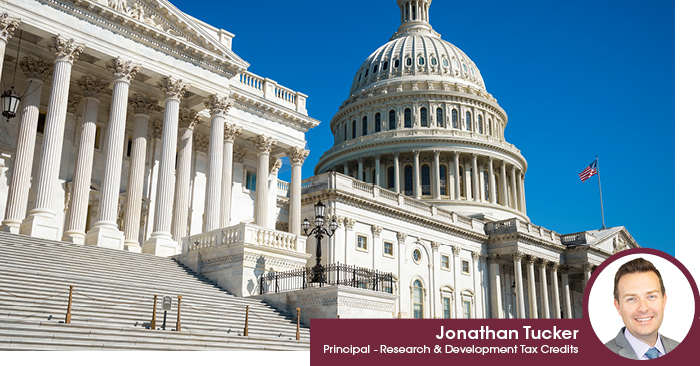Follow KBKG on Social Media
By Jonathan Tucker | Principal, Research & Development Tax Credits
Since the House passed the huge new tax and spending bill called the One Big Beautiful Bill Act (OBBBA) just before Memorial Day by one vote, and the Senate Finance Committee just released text of their version of the bill on June 16, OBBBA is now in the Senate waiting for markup and debate, and things are already getting messy, both in the Senate and House.
Several key Senators have raised concerns over areas related to energy credits, temporary tax provisions, and Medicaid cuts, demanding amendments before they consider supporting it. Meanwhile, House members who barely supported the bill are now facing pressure from constituents over its potential economic impact and changes the Senate might make that will harm their constituents.
What’s Happening in the Senate
The Senate (where Republicans hold a 3 vote majority) is putting their touches and priorities on the bill, but also having to work through a lot of maneuvering parts to ensure they follow budgetary rules for reconciliation, which allows the Senate to pass the bill on a simple majority verses the traditional “filibuster proof” 60 votes.
This would require Democrat support, which Republicans have not included Democrats in any negotiations. The rule in the Senate is called the Byrd Rule, which says every part of the bill must directly affect the budget, either by changing taxes or spending. If not, it needs 60 votes to stay, or it gets removed. In addition, the bill cannot increase the deficit beyond a 10-year window. It appears there are some parts of OBBBA that might not pass this test, so senators will need to go section-by-section and clean it up.
In addition to budgetary maneuvering, there is a lot of debate on many of the items in the bill the House included. Some House members wanted to take away green energy tax breaks created in the Inflation Reduction Act (IRA), but several Republican senators say that is a bad idea. They argue those credits:
- Help companies build factories in the U.S.
- Lower utility bills
- Provide stability for businesses that have already planned around those credits
The Senate seems to keep some of those clean energy benefits instead of removing them or phasing them out more slowly.
The House version gives tax breaks to businesses, but only temporarily, and the Senate says that is not good enough. They want those tax cuts to be permanent, especially for:
- Bonus Depreciation
- Immediate deduction of research and experimental expenditures
- Interest deductions
The House version would raise the SALT deduction limit from $10,000 to $40,000 for people making less than $500,000. There are no Republicans in the Senate who support this, as there are no Republican Senators from supposed “high tax states.” Some have stated they want the deduction to go away entirely, or back to the original $10,000 limit put in place in the first Trump tax Bill in 2017 (the Tax Cuts and Jobs Act). Removing this or “keeping” the $10,000 limit will most certainly tank the bill back in the House.
Lastly, there are others who are worried that this bill adds too much to the national debt and does not address enough spending cuts.
Additionally, recently, some House members are saying “Oops” to voting for the bill. After the vote, several House members admitted they did not read the whole bill before voting yes, and now they are having second thoughts.
Some say they were rushed, did not understand what was buried in the details, or regret trusting that it would all work out. However, some of these changes House members regret voting for might break the Senate’s rules, so they could get removed in the Senate version of the bill.
What’s Next
Senate Republicans are aiming to vote on their version by July 4, 2025. However, with all the moving parts, and some lawmakers realizing what is actually in the bill, it is getting tricky. The Senate Majority Leader, John Thune (R-SD) said, “We’ll work hard to fix it, but failure is not an option.”
How KBKG Can Help
KBKG and its experts specialize in navigating complex tax legislation and translating policy shifts into practical, strategic solutions. Businesses and individuals with questions about current or proposed tax incentives, such as bonus depreciation or Section 174 treatment, are encouraged to contact a KBKG expert today for guidance tailored to their situation.
About the Author
Jonathan Tucker | Principal – Research & Development Tax Credits
Jonathan Tucker is based in Atlanta, GA, and has over 20 years of experience providing federal business tax advisory services, primarily in R&D tax credits, to clients in various industries including technology, manufacturing, transportation, healthcare, retail and consumer products, hospitality, media and entertainment, financial, and other professional services industries. Read More



